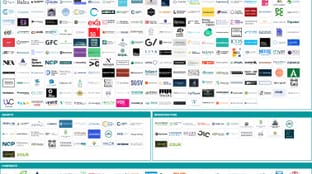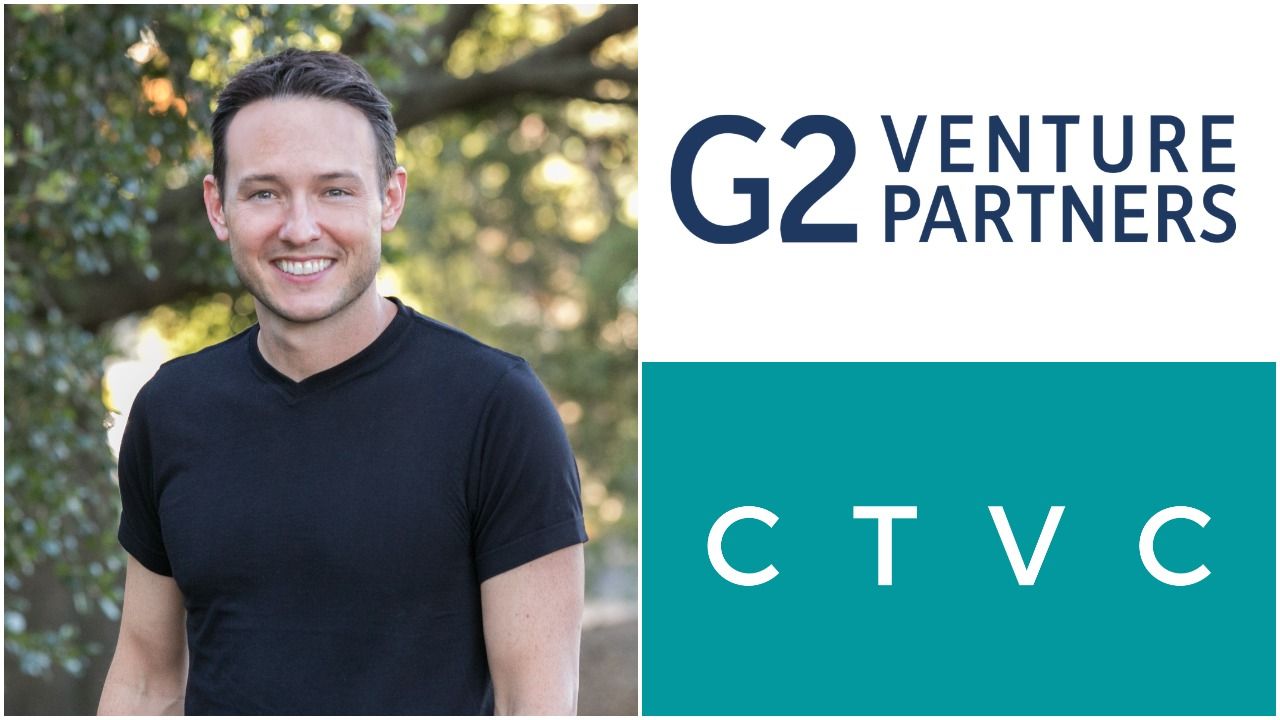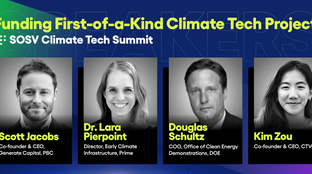
🌏 Who are the Climate Tech Investors?
A new interactive Climate Capital Stack Map
G2 Venture Partners raises $500mm to fund sustainable technologies

Proterra boarded the SPAC bus this week, going public through a merger with ArcLight Clean Transition Corp at a $1.6b valuation. In addition to minting a new portfolio unicorn, it’s been a big week for early Proterra investors G2 Venture Partners - the firm announced Fund II. G2 will use their fresh $500m arsenal to support sustainable technologies across legacy industrial industries like transportation, logistics, manufacturing, agriculture, and energy. We sat down with Ben Kortlang, founding Partner at G2, to hear his take on investing in the past 20 years of sustainable industrial transformation. Note: This interview is best read in Ben’s signature Australian accent.
You had a front row seat to Cleantech 1.0 at the Kleiner Perkins Green Growth Fund. What stands out from investing at KP during that period?
I actually started investing in cleantech even before Kleiner Perkins. I helped to run the alternative energy investing business at Goldman Sachs for eight years beforehand, which was actually quite an exciting time for renewables when US wind and solar were just starting to take off.
The start of my time at Kleiner Perkins was a period of great hope. Al Gore had just published An Inconvenient Truth, which brought the climate crisis into the world’s consciousness. The venture industry had amassed an enormous amount of brain power, talent, resources, and capital to address the climate crisis. Just a few short years later, we were in a time of despair as the financial crisis hit. A set of macro factors conspired against cleantech’s great promise, and the venture industry really abandoned cleantech. Everyone rushed to greener pastures in digital and internet, and there was a time where it felt like cleantech just wasn't working. That was the low light.
While the industry abandoned cleantech, Kleiner continued to back the Green Growth Fund team. We stayed together and continued to support the portfolio. Some tremendously important companies emerged from that phase - growth companies like Proterra (which went public this week) Enphase and Silver Spring Networks, and venture businesses like Beyond Meat, Nest and QuantumScape.
If I wind the clock back a decade, at the time it felt like cleantech investing wasn't working. Later, it turned out that cleantech had been working all along. To Kleiner’s credit, they let us stick with it. We continued to refine our approach with that leeway and built a very successful sustainable investing franchise.
Unlike many other cleantech venture firms, your KP team was able to “weather” the storm. What opportunities did you see that others missed when you spun out G2 in 2017?
The venture industry is very good at chasing heat. When deals are getting done and returns are being printed, venture capitalizes. The industry had moved away from cleantech back in 2010-2013, but we saw that our approach had worked during a time of headwinds and we knew that the climate crisis was only getting more urgent. We had conviction that the tailwinds would eventually emerge - and that the longer the world waited to take climate action, the more amplified that our actions would need to be.
Our macro thesis was that if we could make good money investing during a tough period, when the tailwinds arrived - because they had to - then we would make great money. We're now in that period. We spun out from KP in 2017 because their core venture focus was digital investing, and we wanted to continue pursuing that same Green Growth Fund mission. We still have a tremendously strong relationship with KP.
Your partner David Mount penned an insightful article reassessing the perception of Cleantech 1.0 as a failure, noting that $25b invested in CT1.0 companies between 2006-2011 would be worth +$200b today. How does this historical context inform the way you think about picking winners today?
It's not that every company gets to be a large company if you're in the right space. You still have to back companies that have a clear, differentiated vision of the future and demonstrate the ability to execute. The prize for those companies are enormous.
When you think about the magnitude of the economic transformation required to hit the Biden administration's ‘50% carbon reduction by 2030’ goal, it is undoubtedly the greatest economic opportunity of our lifetime. The winning companies won't be worth billions or tens of billions. They'll be worth hundreds of billions or trillions if we can pull off that goal. That magnitude of change in that short a period of time can't be done with solely improved practices, processes or operations, it can only be done through massive technological change. It will be venture-backed companies that are driving that, and they will be extraordinarily valuable.
How do you think about the spectrum of emerging climate tech venture firms focused on “silver bullet” decarbonization solutions (e.g., Breakthrough Energy Ventures) and where G2 fits in?
The question is what do you need to do to break through on climate: change-the-world energy or sustainability technologies, or deployment of technologies that work with existing industrial infrastructure? The answer is both. When Bill Gates was forming Breakthrough Energy Ventures, we sat down with him, John Doerr and many others and had this exact conversation. Breakthrough Energy Ventures is very focused on the major innovations that are needed to get to zero carbon or 100% carbon reduction. We are focused on taking technologies that are working and deploying them into the industrial environment. We have a special skill set around that. The technology exists to hit 50% CO2 reduction by 2030. It doesn't yet exist to hit 100% CO2 reduction by 2050 so the world needs both kinds of investors.
G2 invests in emerging technologies that are transforming traditional industries. What does that mean to you and how does it tie into climate tech?
We define traditional industries - the core industries we focus on - to be energy, transportation, logistics, industrial manufacturing, and agriculture. It's really any industry that hasn't been through its digital revolution or become sustainable. Those industries represent about two-thirds of global GDP, and more than 80% of global emissions. Those are the industries that need to be transformed. Those are the industries that need to do more with less, to continue to grow with economic solutions to reduce their environmental footprint.
When we talk about transforming those industries, it is really every aspect of those industries. There isn't a silver bullet solution here. You cannot just replace coal plants with solar plants or internal combustion engines with electric. Those are important but we have to make everything that happens in those industries more efficient.
I'll give you an example. A company we recently invested in, ProducePay, is digitizing the fresh produce space. You might think about fresh produce and say, “Well, that's not really a space that is consuming a lot of CO2”. But when you go to the grocery store and buy food, you may not realize that it’s gone through an incredibly inefficient journey to get there. The average piece of food you eat in the US has traveled 1500 miles, been out of the ground or off the vine for 3-12 months, and been handled 6 times. One third of all food that's grown is never eaten. The technology exists today to enable a much more direct and efficient supply chain, but that requires digitization of all of the information and transactions along the space. We think this is a huge opportunity and know the technology exists today to accomplish it.
How do your LPs influence G2’s value add in helping startups drive digitalization and decarbonization in these traditional industries?
Our specialty is helping companies grow from an order of magnitude of $10 million to $100+ million in revenue and then ultimately to an exit. That's what we’ve done particularly well. We bring our industrial network to bear in helping grow these companies. Shell, Daimler, Mitsui are a few of the many companies in our industrial network that we’re able to introduce to our portfolio companies to help them grow. We also use these relationships to help us decide which companies to invest in. The deals that have been done between our portfolio companies and companies in our industrial network have been transformational.
A great example is Proterra, which went public this week. We helped them establish a huge deal with Daimler to build electric buses through the Thomas Built Buses and Freightliner divisions. The strategy of bringing technologies to market to support existing incumbents is actually quite differentiated from traditional venture capital, which tends to be about inventing a new technology that's going to displace the incumbents. One of the things really important in the industrial space is that for the most part, you don't displace the incumbents. Instead, you serve the incumbents and help them become more efficient. That's why our experience and network is so valuable to these companies as they're trying to address the industrial space.
Are these LPs asking for explicit impact metrics? How are they thinking about climate?
Our LP base cares both about making great returns and about impacting climate. Every LP is at a different point on the spectrum of how much they care about those things. Our activities are not necessarily driven solely by our LPs, but rather what we care about and what we think is right. It’s difficult to fit all companies into exactly the same framework. The climate story varies - whether it’s about making supply chains more efficient, enabling electrification, bespoke hardware, or safety. One company can have many aspects of environmental and broader impact. We have some extremely impact and climate focused LPs, and other LPs who primarily want to make a lot of money. We have achieved both goals so far and hope to continue.
Why did G2 choose to focus on growth stage investing? What comparable changes have you seen across the earlier stage venture and growth classes over the last few years?
The reason we’re focused on growth stage companies is that a lot of the mistakes of Clean Tech 1.0 were taking too much risk on technology, capital, and time. The combination of those things compound and are added to other risks such as competition, industry, commodity pricing, regulatory, etc. Growth stage means for us that the technology is working, the companies are earning revenue, and the customers are telling us that the product is awesome. By finding companies that are winning right at their inflection points, we’re able to avoid that set of risks that was a major challenge in Clean Tech 1.0. You can do venture investing successfully in this space at an earlier stage, but you have to be aware of those risks and build that into your investing process. All stages are needed. Our focus is helping growth stage companies penetrate industrial markets.
How will G2 compete or team with the “Walmarts of capital” like Tiger and previously The Vision Fund who move extremely quickly and with limited diligence to deploy large, competitively priced investments into earlier and earlier stage businesses?
We haven’t come across them in many of the investments we have looked at. Even if they do come into the space and compete with us, we are well positioned to win because we have the deepest knowledge and the strongest proprietary points of view on the space. We can pay a full valuation because we know so deeply and so well that the company is winning, which is often not obvious from all the external data points. We do extremely deep research, talk to the customers, and talk to our industrial network to inform that proprietary point of view. We're often finding things that are off the beaten path of those later stage investors. When we do intersect with them, we have a deep proprietary point of view that allows us to pay a “market winning” price for those companies. Also, companies usually don't just want money. They want the help, experience, network, and knowledge that an active VC like G2 can bring to the table to help them grow.
You’ve seen a couple exits through SPACs (Luminar, Proterra). How do you evaluate SPACs as an exit pathway for your portcos (vs an acquisition or traditional IPO) and where do you see this market headed?
The SPAC market became a significant option for exit over the last year. We expect it to continue to be an option, but only see it being used by the right type of companies in the right situations. The mistake that the industry has made both on the company side and the SPAC side is using it as a tool to allow unproven lower quality companies go public that couldn’t have gone public via IPO. We haven't done that. We've taken high quality companies public that happened to be at the right stage and have the capital needs that made a SPAC right for them. We haven't taken our other 12 G2 portfolio companies public via SPAC because it wasn’t the right fit--either they weren't ready for the public markets or we think there was a more appropriate exit option via IPO or M&A. SPACs are a tool for the right companies in the right situations.
You just raised a $500m new fund, congrats! What does this enable you to do? What comes next?
More of the same. We are still looking for fantastic businesses that are winning in bringing technology to the industrial sector to help it be more sustainable and grow. We are looking to back those companies and help build them into even greater companies over time. That's what we've been doing for the last decade plus and it's what we are continuing to do. We have expanded our team in connection with this fund and we're continuing to expand it, along with check size. What was in the prior fund $10-$35 million checks will turn into $10-$50 million checks, potentially even larger for the right company and situation. Our methodology and team has worked well, so we’ll be continuing with the same approach.
If green is your kind of growth, G2 always wants to hear from great entrepreneurs and management team candidates. The portfolio is on a tear with 600 open roles, and the G2 team itself is growing - check out the G2 Venture Partners Associate role.

A new interactive Climate Capital Stack Map

Financing around first- or early-of-a-kind project risk

‘Government-enabled, private sector-led’ in action in Washington, DC